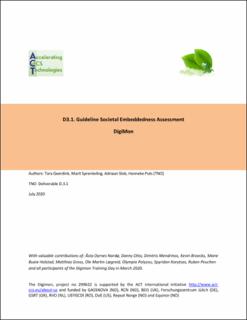Guideline Societal Embeddedness Assessment
| dc.contributor.author | Geerdink, Tara | |
| dc.contributor.author | Sprenkeling, Marit | |
| dc.contributor.author | Slob, Adriaan | |
| dc.contributor.author | Puts, Hanneke | |
| dc.date.accessioned | 2023-04-19T07:57:16Z | |
| dc.date.available | 2023-04-19T07:57:16Z | |
| dc.date.issued | 2020 | |
| dc.identifier.uri | https://hdl.handle.net/11250/3063714 | |
| dc.description.abstract | The Societal Embeddedness Level (SEL) is a novel methodology which provides insight in the societal requirements for a technological innovation to be deployed. It contributes to the realization of technological innovations in society: a societal embedded technological innovation accelerates and improves the chance of success for deployment. This methodology is developed for technological innovations that impact the environment. Although several other readiness tools exist, they merely focus on technological aspects; the SEL methodology focuses on the societal aspects that are crucial for the further development of a technological innovation. Societal obstacles could delay or hamper its deployment. Both technical and societal factors thus influence the readiness of a technological innovation for further deployment. The SEL is a methodology which can be used by researchers and technology developers for: 1. Assessment of the current Societal Embeddedness Level to provide insight in societal factors that are crucial for development of the technological innovation from exploration to a proven technology; 2. Providing insight into current societal challenges still to overcome towards deployment; 3. Monitoring and evaluating the societal embeddedness during technology development. | en_US |
| dc.language.iso | eng | en_US |
| dc.relation.ispartofseries | DigiMon ACT2 (NORCE);D3.1 | |
| dc.title | Guideline Societal Embeddedness Assessment | en_US |
| dc.type | Research report | en_US |
| dc.relation.project | DigiMon - ACT2 | en_US |
